Book 9_U4_重点词汇讲解
Book 9_U4_语法

牛津高中资源库之语法设计单元:Unit 4 Behind beliefs板块:语法一、语法知识归纳I. 复杂句子的分析II. 简单句的基本句型复习IV. 复合句分类复习二、语法拓展训练(一)单项填空1. _________ you show any fear, the tiger will attack you.A. OnceB. UntilC. TillD. While2. The master will not attend our meeting__________ he _______ free.A. if; will beB. if; isC. unless; shall beD. unless; is3.—Do you have any idea what Hank does all day?—I know he spends at least as much time watching TV as he __________.A. does writingB. writesC. is writingD. does to write4.If the way _____ you do the job is wrong, you will surely fail ____ good your idea may be.A. how; howeverB. /; howeverC. that; whateverD. in which; how 5.She must have gone out early, _____ she had not shown up at breakfast.A. becauseB. sinceC. forD. therefore6._______ I could write down the number of the bus, the bus had run away.A. BeforeB. UnlessC. UntilD. Once7.________, she knows the city very well.A. As she is blindB. As blind she isC. Blind as she isD. She is as blind 8.Christie stared angrily at her boss and turned away, as though ______ out of the office.A. to goB. wentC. goneD. would go 9.—Excuse me, is there a gas station around _______ I can fill up my tank?—Of course, there is one at the end of the road.A. thatB. in whichC. whereD. which10.I was advised to arrange for insurance _____ I needed some medical treatment.A. so thatB. in caseC. for fear ofD. though11.—Do you remember _______ our manager came?—Y es, I do, he came in his car.A. howB. whenC. thatD. if12._________ the man grew older, he lost interest in everything except gardening.A. WithB. SinceC. WhileD. As13.Doing your homework is a way to improve your test scores, and this is especially true _____ it _____ classroom tests.A. before; getsB. as; makesC. since; takesD. when; comes to14.When he reads books, his habit is to make a mark _______ the meaning is unclear to him.A. thereB. whereverC. the placeD. in which15.It was not ______ he took off his dark glasses _____ I realized he was a famous football star.A. when; thatB. until; didC. when; thenD. until; that16.The boy dived into the water and after _____ seemed to be a long time, he came up again.A. whatB. thatC. itD. which17.These two areas are similar _____ they both have a high rainfall during this season.A. except thatB. in whichC. in thatD. so that18.Small sailboats can easily turn over in the water_____ they are not managed carefully.A. thoughB. untilC. beforeD. if19.Scientists believe native Americans arrived by crossing the land bridge that connected Siberia and ________ more than 10,000 years ago.A. this is AlaskaB. Alaska is nowC. is now AlaskaD. what is now Alaska20.Look at the watch. Don’t you see it is ______ watch _______ Helen lost the other day?A. as the same ; asB. the same ; asC. the same ; whichD. as the same ;that21.Y ou should put the dictionary _______ you can find it easily.A. whereB. the placeC. the place on whichD. what22.She said to me, “I’ll tell you the result of test_______ I know it.”A. becauseB. the momentC. afterD. though23.That is the reason ______ he gave us for carrying out the plan.A. becauseB. whyC. howD. that24.Was it in the village ______ we used to live in ______ the accident happened?A. where; thatB. which; thatC. that; whereD. where; which25.The hours _______ the children spend in their one-way relationship with television people undoubtedly affected their relationship with real-life people.A. thatB. whenC. in whichD. on which26.Mr. Smith will move into his new house next Sunday, ____ it will be completely finished.A. on that timeB. by which timeC. on whichD. by the time27.In the book, Newton is shown as a gifted scientist who stood at the point in history ______ magic ended and science began.A. whereB. whenC. thatD. which28.The treatment will continue until the patient reaches the point ______ he can walk correctly and safely.A. whenB. whereC. whichD. whose29.In an hour, we can travel to places ______ would have taken our ancestors days to reach.A. whatB. whenC. whichD. what30.I have many friends, _______ some are businessmen.A. of themB. from whichC. who ofD. of whom(二)选词填空1. —Did you return Fre d’s call?—I didn’t need to________ I’ll see him tomorrow.2. The companies are working together to create _______ they hope will be the best means oftransport in the 21st century.3. We’ll have a picnic in the par k this Sunday ________ it rains or i t’s very cold.4. The Mississippi River is the place _________ Mark Twain spent much of his childhood.5. It has been proved ________ eating vegetables in childhood helps to protect you againstserious illnesses in later life.6. The artist was born poor, ________ poor he remained all his life.7. The roof leaks ________ it rains.8. Occasions are quite rare_________ I have the time to spend a day with my kids.9. In some places women are expected to earn money _________ men work at home and raisetheir children.10. Y ou have our support, ________ you decide.(三)句子改错1. If he will come or not is unknown.2. He has won the prize is true.3. The question is that whether it is worth trying.4. I am satisfied that you have done is right.5. I’l l give the gift to whomever comes first.6. Some children want to challenge themselves by learning a language different from which their parents speak at home.7. Don’t promise anything when you are one hundred percent sure.8. Tomorrow is Tom’s birth day. Have you got any idea that the party is to be held?9. As is known to all that Taiwan is part of China.10. Nancy enjoyed herself so much that she visited her friends in Sydney last year.(四)中译英1. 有许多种运动,但我最喜欢的是散步。
牛津英语九年级上册u4知识点
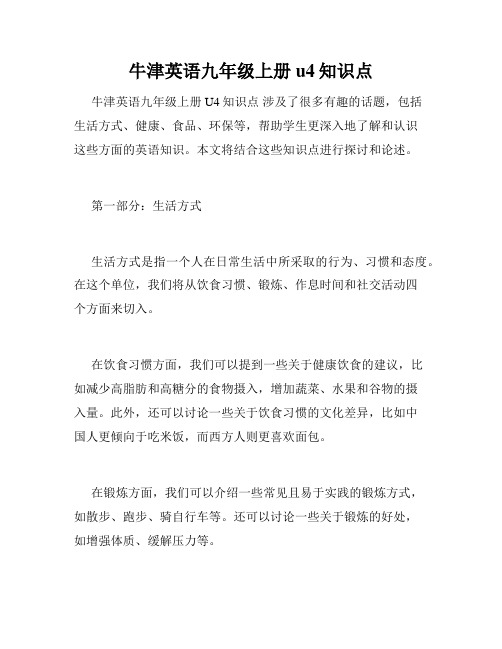
牛津英语九年级上册u4知识点牛津英语九年级上册U4知识点涉及了很多有趣的话题,包括生活方式、健康、食品、环保等,帮助学生更深入地了解和认识这些方面的英语知识。
本文将结合这些知识点进行探讨和论述。
第一部分:生活方式生活方式是指一个人在日常生活中所采取的行为、习惯和态度。
在这个单位,我们将从饮食习惯、锻炼、作息时间和社交活动四个方面来切入。
在饮食习惯方面,我们可以提到一些关于健康饮食的建议,比如减少高脂肪和高糖分的食物摄入,增加蔬菜、水果和谷物的摄入量。
此外,还可以讨论一些关于饮食习惯的文化差异,比如中国人更倾向于吃米饭,而西方人则更喜欢面包。
在锻炼方面,我们可以介绍一些常见且易于实践的锻炼方式,如散步、跑步、骑自行车等。
还可以讨论一些关于锻炼的好处,如增强体质、缓解压力等。
在作息时间方面,我们可以讨论合理的作息时间决定了一个人的生活状态和身心健康。
可以介绍一些关于如何合理分配时间的建议,比如规律的作息时间、适量的休息等。
在社交活动方面,我们可以讨论一些关于交朋友和社交礼仪的话题,如如何主动交朋友、如何在社交场合中表现得自然大方等。
还可以讨论一些关于线上社交和线下社交的差异和特点。
第二部分:健康健康是指身体和心理的良好状态。
在这个部分,我们可以从饮食、锻炼和心理健康三个方面来展开论述。
在饮食方面,我们可以介绍一些关于健康饮食的原则和方法,如均衡饮食、多吃新鲜食品等。
可以讨论一些关于不健康饮食对身体的危害,如肥胖、心脏病等。
在锻炼方面,我们可以介绍一些关于锻炼的好处,如增强体质、提高免疫力等。
可以分享一些适合学生锻炼的运动,如篮球、游泳等。
在心理健康方面,我们可以介绍一些关于如何保持心理健康的方法和技巧,如积极乐观的态度、学会应对压力等。
还可以讨论一些关于心理健康问题的常见症状和应对方法,比如压力过大、焦虑等。
第三部分:食品食品是我们日常生活中必不可少的一部分。
在这个部分,我们可以从食品安全、时令食材和饮食文化等方面进行论述。
BOOK9重点单词、短语及句型
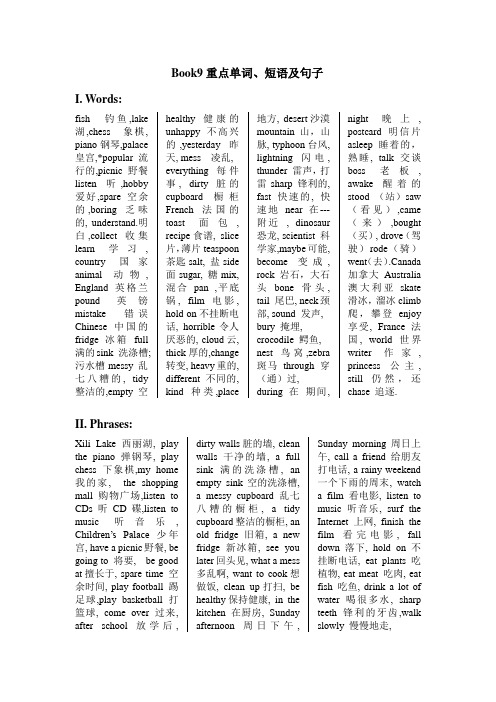
Book9重点单词、短语及句子I. Words:fish 钓鱼,lake 湖,chess 象棋, piano钢琴,palace 皇宫,*popular 流行的,picnic 野餐listen 听,hobby 爱好,spare 空余的,boring 乏味的, understand.明白,collect 收集learn学习, country 国家animal动物, England英格兰pound英镑mistake 错误Chinese中国的fridge 冰箱full 满的sink 洗涤槽;污水槽messy 乱七八糟的, tidy 整洁的,empty 空healthy 健康的unhappy 不高兴的,yesterday 昨天, mess 凌乱,everything 每件事, dirty脏的cupboard 橱柜French 法国的toast 面包,recipe食谱, slice片,薄片teaspoon茶匙salt, 盐side面sugar, 糖mix,混合pan ,平底锅,film电影,hold on不挂断电话, horrible令人厌恶的, cloud云,thick厚的,change转变, heavy重的,different不同的,kind种类,place地方, desert沙漠mountain山,山脉, typhoon台风,lightning 闪电,thunder 雷声,打雷sharp 锋利的,fast 快速的, 快速地near 在---附近, dinosaur恐龙, scientist 科学家,maybe可能,become 变成,rock 岩石,大石头bone 骨头,tail 尾巴, neck颈部, sound 发声,bury 掩埋,crocodile 鳄鱼,nest鸟窝,zebra斑马through 穿(通)过,during 在期间,night 晚上,postcard 明信片asleep 睡着的,熟睡, talk 交谈boss 老板,awake 醒着的stood (站)saw(看见),came(来),bought(买), drove(驾驶)rode(骑)went(去).Canada加拿大Australia澳大利亚skate滑冰,溜冰climb爬,攀登enjoy享受, France法国, world 世界writer 作家,princess公主,still 仍然,还chase 追逐.II. Phrases:Xili Lake西丽湖, play the piano 弹钢琴, play chess下象棋,my home 我的家, the shopping mall购物广场,listen to CDs听CD碟,listen to music听音乐, Children’s Palace 少年宫, have a picnic野餐, be going to 将要, be good at擅长于, spare time 空余时间, play football 踢足球,play basketball打篮球, come over过来, after school 放学后, dirty walls脏的墙, cleanwalls干净的墙, a fullsink 满的洗涤槽, anempty sink空的洗涤槽,a messy cupboard 乱七八糟的橱柜, a tidycupboard整洁的橱柜, anold fridge旧箱, a newfridge 新冰箱, see youlater回头见, what a mess多乱啊, want to cook想做饭, clean up打扫, behealthy保持健康, in thekitchen在厨房, Sundayafternoon周日下午,Sunday morning周日上午, call a friend 给朋友打电话, a rainy weekend一个下雨的周末, watcha film 看电影, listen tomusic 听音乐, surf theInternet 上网, finish thefilm 看完电影, falldown 落下, hold on 不挂断电话, eat plants 吃植物, eat meat 吃肉, eatfish 吃鱼, drink a lot ofwater 喝很多水, sharpteeth 锋利的牙齿,walkslowly 慢慢地走,run fast跑得快, watch birds 看鸟, see zebras 看斑马, ride through…乘车通过(某地), drive to …开车到(某地), buy a hat 买帽子, gift shop 礼品店, the UK 英国, ski and skate 滑雪和滑冰, the US 美国, visitGrandma and Grandpa看望爷爷奶奶,外公外婆,Syndney Opera House悉尼歌剧院, have aholiday 度假, takephotos 照相, in theshade 在阴凉处, playwith 和......一起玩,climb a mountain 爬山,play volleyball on thebeach 在海滩上打排球.III. Sentences1 What do you do in your spare time? 你空余时间里干什么?I watch TV and play chess. 我看电视和下棋。
Book9-Unit4短语

Book9-Unit4 记忆词组1. date back to/date from(时间点);追溯到(无被动语态, 用于一般现在时)2. on a large scale 大规模地3. show/take great interest in 对…感兴趣4. take/seize the opportunity of 抓住机会5. go on expedition 探险,考察6. one such person; no such school 有这样一个人;没有这样的学校7. vast/huge/large quantities of大量的a (vast) variety of许多,各种各样的8. place/put restriction on 对…实行限制lift restriction on取消对…的限制9. fail to do sth 没能做…10. introduce… in/into 引进,推行introduce sb to sth 向某人介绍某事treat sb to sth 请某人吃…11. be rewarded with 得到回报,奖赏12.attach importance/value/weight to 认为…有重要性/价值/分量13. be attached to附属于…, 喜欢,依恋;14. pass sth on to sb 将…传给…15. in conflict with 与…意见不一致come into conflict 发生冲突16. appeal to(介词) 有吸引力;呼吁,恳求;上诉17. give out分发;散发出(气味,热); 筋疲力尽;发表,公布18. adapt to 适应19.over time 经过一段时间,长期以来over lunch20. at sea 在海上21. likewise=similarly adv.同样地22. lay eggs (laid, laid) 产卵23. stick to 粘在…上; 坚持,忠于,信守(原则,理念)24. tear(tore, torn)…apart 把…扯开,拉开25. sweet tooth 爱吃甜食。
2020牛津英语九年级英语上9A第四单元知识梳理

【文库独家】Book 9 A Unit 4知识梳理一、词汇(22个)far(比较级)______(最高级)______week(形容词)_____come(形容词)______Asian(名词)_________ murder(名)______direct(名词)______mystery(复数)_____scare(形容词)______ spaceman(复数)______ documentary(复数)_____appear(名词)______disturb(形容词)____ act(名词)_____late(形容词)______ skate(名词)______comedy(复数)_______view(名词)________ regularly(比较级)_______agree(反义词)_____sport(形容词)______surprise(形容词)______end(名词)______二、.词组1.far too busy to go shopping2. have nothing to do3. a weekly round-up4. send text messages to 13965. find….a bit boring6. the least favourite programme7. send out programmes on TV 8. be found dead9.a number of interviews with… 10. up-to-date information11. this coming Saturday 12. two free concert tickets13. kill oneself 14. be full of/be filled with horror and mysteries15. take a close look at… 16. be a bit disturbed while watching…17. win an award for… 18. Beijing Music Awards19.feel scared easily 20. win a great prize21. be covered live 22. a report on preparations for…23. take a shower 24. drama series25. be interviewed about the recent work 26. watch a chat show/a game show27. a thank-you letter 28. the latest information29. a film directed by… 30. think of a surprising ending31. vote online for their favourite songs 32. how much danger they face33. a one-hour documentary 34.be killed for…35.argue with sb about sth. 36.It is you who made our story so perfect.。
外研版Book9M4 知识点
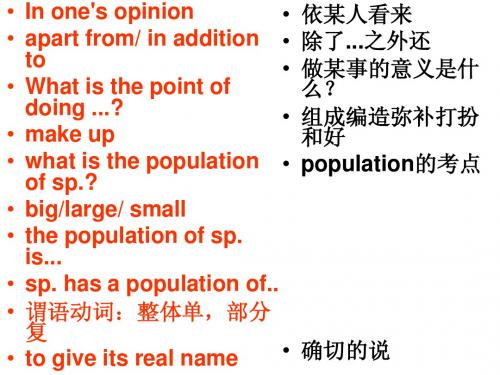
• 据估计... • 许多,大量 • • • • 据预测... 阻止...做某事 源自 而且
• 也,又 • 也,又 • 它被造就成联合国的 第六种官方语言。 • 例如 • 在...的控制下
• When it gained independence, the use of P expanded all over the world. • with the help of... • They are all more or less based on the same root language. • have problems/ difficulty/ trouble in doing • have no lessons • make sense of
• 我们再...也不为过
• refer to • 我没听懂。
• 在过去的几年里(时 态) • 除了...之外; • 除了...之外还
• 从语言学角度讲/坦 白地说/诚实的说/一 般来说/严格来说/广 泛的说 • 源自法语
• • • • • 和...一样 要不是因为 相反 禁止(某人)做某事 我们只能等待。
• • • • • •• • • Nhomakorabea•
refer to ...as enthusiasm for... be enthusiastic about lead to free sb from sth. ...take it for granted that.. for one's sake make the best of =make full use of one in ten= one out of ten be believed to have done/ to be doing/ to do
人教版英语九年级U4知识点

人教版英语九年级U4知识点概述作为九年级学生,我们正在学习人教版英语教材,对于Unit 4的知识点,我们将进行一次概述。
这个单元主要包括了一些基本的语法、词汇和阅读理解技巧。
首先,让我们来看一下这个单元的语法部分。
在Unit 4中,学生将学习比较级和最高级的形式与用法。
我们经常会用到比较级和最高级来比较不同事物的大小、高低、速度或者质量等等。
例如,我们可以说,“The book is more interesting than the movie.”(这本书比电影更有趣)或者“She is the tallest girl in the class.”(她是班上最高的女孩)。
接下来,我们来看一下这个单元的词汇部分。
在Unit 4中,学生将学习一些与颜色、衣着和描述外貌特征相关的词汇。
例如,我们可以学习词汇如red(红色)、pants(裤子)、big(大的)、tall(高的)等等。
通过学习这些词汇,我们可以更准确地描述我们所见到的事物和人物。
除了语法和词汇,阅读理解也是这个单元的重要一部分。
通过阅读不同的文章和故事,我们可以提高我们的阅读理解技巧和词汇运用能力。
同时,我们也可以了解一些与我们生活相关的话题,比如环境保护、交通安全以及健康生活等。
通过阅读,我们可以拓宽我们的知识领域,培养我们的思维能力和阅读能力。
总之,Unit 4是九年级英语教材中的一个重要部分。
通过学习这个单元,我们可以提高我们的语法、词汇和阅读理解能力。
这些知识将对我们的英语学习和将来的学习生活产生积极的影响。
在未来的学习中,我们可以继续探索更多的英语知识,提高我们的英语水平。
希望我们能够享受英语学习的过程,成为一名优秀的英语学习者。
Book9_U4_重点词汇讲解

M9 U4 单词预习案部分单词讲解1.straightforwardI must insist on your giving me a straightforward answer. 简单的,易懂的I'm quite a straightforward man. 坦诚的,率直的They took a straightforward route to the lake. 径直的,一直向前的2. by and by不久,过一会儿意思相当于soonWe’ll meet again by and by.By and by the rest of my family came on board.3.underline1) vt. 在……的下面划线The key words are underlined. 关键的字下面划了线。
2) vt. 强调; 突出to underline the importance of harmony 强调和谐的重要性This example underlines the consequences of bad management.这个例子突显了管理不好的后果。
His refusal to go underlined his dislike of the place.他拒绝去那里突出了他不喜欢那地方的事实。
In his speech he underlined several points. 在他的演讲中他强调了几个重点。
4.strike1)vt.打;敲;击;遭受撞击;击中;打中strike-struck-struck/strickenStrike while iron is hot. 趁热打铁。
The boy struck the man with a stick. 那男孩用一根棒击打中了那人。
He struck the other man hard on the face with his fist 他用拳狠狠地打了那人的脸。
九年级英语书u4短语知识点

九年级英语书u4短语知识点九年级英语书U4是一个重要的学习单元,其中的短语知识点是我们必须掌握的。
本文将以较深入的方式来介绍这些知识点,帮助大家更好地理解和应用。
首先,我们来讨论"be used to"和"get used to"这两个表达习惯的短语。
"be used to"表示习惯于某种情况或经历,比如:"I am used to getting up early in the morning."这句话的意思是“我习惯早起。
”而"get used to"则表示逐渐适应某种情况或经历,比如:"It took me some time to get used to the new school."这句话的意思是“我花了一些时间才适应新学校。
”这两个短语常常会让人感到困惑,但是只要我们明确它们的用法,就能够正确地运用。
接下来,让我们来学习"look forward to"和"be afraid of"这两个表达期待和害怕的短语。
"look forward to"表示期待或期望某件事情的发生,比如:"I am looking forward to the summer vacation."这句话的意思是“我期待着暑假的到来。
”而"be afraid of"表示害怕某种情况或事物,比如:"She is afraid of spiders."这句话的意思是“她害怕蜘蛛。
”这两个短语的用法非常常见,掌握它们将使我们的表达更加准确。
除了以上提到的短语,还有一些更加常用的短语也需要我们牢记在心。
比如"turn off"表示关闭,"take off"表示脱下,"put on"表示穿上,"get on"表示上车,"get off"表示下车等等。
人教版九年级u4知识点

人教版九年级u4知识点人教版九年级英语Unit 4知识点解析Unit 4 of the 9th-grade English textbook published by People's Education Press is a unit primarily focused on reading comprehension, vocabulary, and grammar. In this article, we will delve into the main knowledge points covered in this unit, providing a comprehensive analysis of the content.1. Reading Comprehension:Reading comprehension plays a crucial role in language learning. This unit introduces various types of reading materials such as news reports, magazine articles, and personal narratives. The exercises included in this unit are designed to enhance students' ability to grasp the main ideas, infer implied meanings, and make logical deductions from the given texts.2. Vocabulary:Vocabulary acquisition is essential in language learning. Unit 4 incorporates a wide range of vocabulary words related to school life, emotions, and personal experiences. Students are encouraged to learnand apply these new words in contextual sentences to improve their own writing and speaking abilities.3. Grammar:Grammar is the backbone of any language. Unit 4 focuses on several important grammar points, including the past continuous tense, modal verbs like could, couldn't, might, and couldn't have, as well as expressions of possibility and certainty. These grammar points are explained in detail and reinforced with various exercises to ensure a solid understanding and practical application by the students.4. Writing Skills:Unit 4 also introduces formal letter writing, helping students create structured and coherent pieces of writing. The focus is on the proper format of a letter, appropriate language use, and the ability to express ideas clearly and concisely. Students are encouraged to express their thoughts effectively while adhering to the conventions of formal writing.5. Listening and Speaking:Listening and speaking skills are crucial for effective communication. This unit provides ample listening materials,incorporating various scenarios such as interviews, discussions, and conversations. By listening to and imitating native speakers, students can improve their pronunciation, intonation, and overall oral fluency.6. Cultural Awareness:Unit 4 also aims to broaden students' cultural horizons and foster cross-cultural understanding. Through texts and activities related to different countries and cultures, students can develop empathy and appreciate the diversity of the world we live in.In conclusion, Unit 4 of the 9th-grade English textbook published by People's Education Press covers a wide range of language skills and knowledge points. By focusing on reading comprehension, vocabulary, grammar, writing skills, listening, speaking, and cultural awareness, this unit provides a comprehensive approach to English language learning. Through consistent practice and application of these knowledge points, students can enhance their language proficiency and develop a deeper understanding of the English language and culture.。
九年级英语课本u4知识点

九年级英语课本u4知识点Unit 4 of the ninth grade English textbook covers a range of interesting and important topics that can greatly enhance students' language skills and cultural knowledge. In this article, we will explore some key points from this unit, diving into the world of the English language and its rich and diverse culture.One of the essential grammar points in Unit 4 is the future tense. Understanding how to express future actions and events is crucial for effective communication. In English, the future is often expressed using the modal verb "will." For example, "I will study hard for the upcoming exam" or "She will go to the party tomorrow." It is important to remember that the verb remains in its base form after "will."Another key topic in Unit 4 is vocabulary related to travel and transportation. Learning how to talk about different modes of transportation not only expands students' vocabulary but also helps them explore the world beyond their immediate surroundings. Words like "airport," "train station," "subway," and "taxi" are essential in helping students express their travel experiences and navigate different environments.Unit 4 also introduces students to the concept of idioms, which are phrases that have a figurative meaning and cannot be understood by their literal definitions. Understanding idioms is crucial for grasping the full richness of the English language. For example, the idiom "put on the back burner" means to postpone or delay something. While it may seem perplexing at first, idioms add color and depth to communication.Cultural knowledge is an important aspect of language learning, and Unit 4 provides insights into English-speaking countries' customs and traditions. For instance, students will learn about the importance of the Thanksgiving holiday in the United States and how it is celebrated. They will also explore the significance of certain British traditions, such as afternoon tea and the royal family.Improving listening skills is another focus in Unit 4. Listening exercises help students become more attuned to different accents, improve their comprehension abilities, and develop critical thinking skills. By engaging in various listening activities, such as watching videos or listening to audio recordings, students can enhance their overall English language proficiency.In addition to the language-specific knowledge, Unit 4 also emphasizes the importance of critical thinking and problem-solvingskills. Students are encouraged to think independently and apply their language skills to real-life situations. They are given opportunities to analyze and discuss various scenarios, fostering their creativity and ability to express opinions effectively.Lastly, Unit 4 offers ample opportunities for students to practice their speaking and writing skills. Working on conversation exercises and writing prompts helps students develop fluency and coherence in their English language use. They can engage in role-plays, debates, and discussions, allowing them to apply the language skills they have acquired throughout the unit.In conclusion, Unit 4 of the ninth grade English textbook covers a wide range of knowledge and skills necessary for language acquisition and cultural understanding. From grammar to vocabulary, idioms to listening exercises, the unit offers students a comprehensive platform to develop their language abilities while delving into the diverse cultures of English-speaking countries. By actively engaging with the content, students can enhance their language proficiency and broaden their horizons.。
牛津英语模块9 Unit4知识总结---精华版
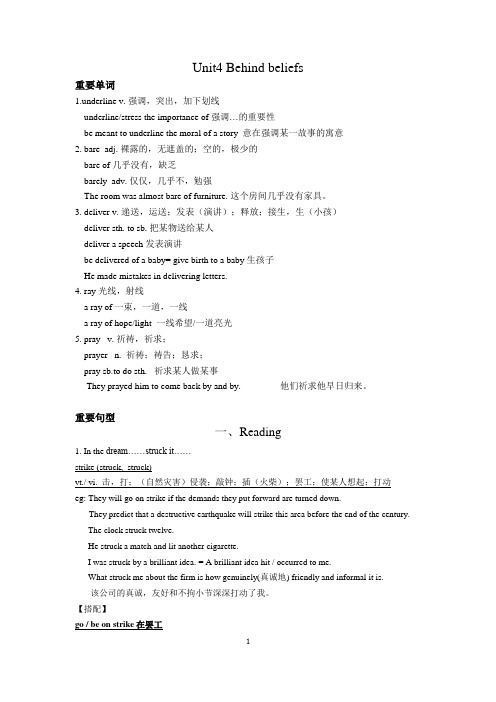
Unit4 Behind beliefs重要单词1.underline v. 强调,突出,加下划线underline/stress the importance of 强调…的重要性be meant to underline the moral of a story 意在强调某一故事的寓意2. bare adj. 裸露的,无遮盖的;空的,极少的bare of 几乎没有,缺乏barely adv. 仅仅,几乎不,勉强The room was almost bare of furniture. 这个房间几乎没有家具。
3. deliver v. 递送,运送;发表(演讲);释放;接生,生(小孩)deliver sth. to sb. 把某物送给某人deliver a speech 发表演讲be delivered of a baby= give birth to a baby 生孩子He made mistakes in delivering letters.4. ray 光线,射线a ray of 一束,一道,一线a ray of hope/light 一线希望/一道亮光5. pray v. 祈祷,祈求;prayer n. 祈祷;祷告;恳求;pray sb.to do sth. 祈求某人做某事They prayed him to come back by and by. 他们祈求他早日归来。
重要句型一、Reading1. In the dream……struck it……strike (struck, struck)vt./ vi. 击,打;(自然灾害)侵袭;敲钟;插(火柴);罢工;使某人想起;打动eg: They will go on strike if the demands they put forward are turned down.They predict that a destructive earthquake will strike this area before the end of the century.The clock struck twelve.He struck a match and lit another cigarette.I was struck by a brilliant idea. = A brilliant idea hit / occurred to me.What struck me about the firm is how genuinely(真诚地) friendly and informal it is.该公司的真诚,友好和不拘小节深深打动了我。
人教版高中英语选修9Unit4知识点汇总
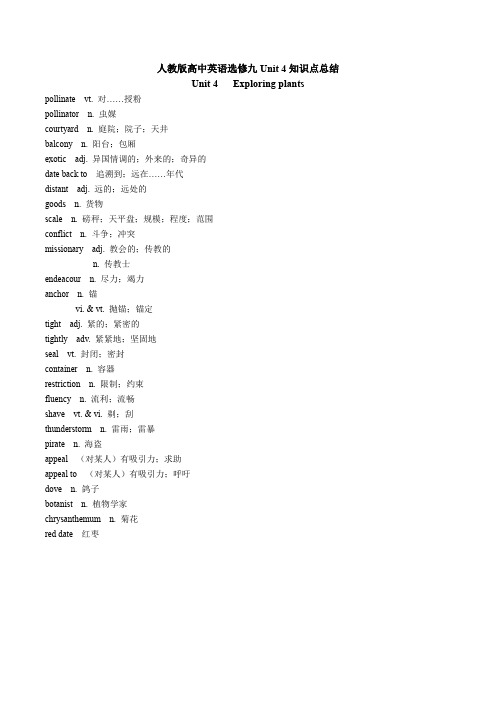
人教版高中英语选修九Unit 4知识点总结Unit 4 Exploring plants pollinate vt. 对……授粉pollinator n. 虫媒courtyard n. 庭院;院子;天井balcony n. 阳台;包厢exotic adj. 异国情调的;外来的;奇异的date back to 追溯到;远在……年代distant adj. 远的;远处的goods n. 货物scale n. 磅秤;天平盘;规模;程度;范围conflict n. 斗争;冲突missionary adj. 教会的;传教的n. 传教士endeacour n. 尽力;竭力anchor n. 锚vi. & vt. 抛锚;锚定tight adj. 紧的;紧密的tightly adv. 紧紧地;坚固地seal vt. 封闭;密封container n. 容器restriction n. 限制;约束fluency n. 流利;流畅shave vt. & vi. 剃;刮thunderstorm n. 雷雨;雷暴pirate n. 海盗appeal (对某人)有吸引力;求助appeal to (对某人)有吸引力;呼吁dove n. 鸽子botanist n. 植物学家chrysanthemum n. 菊花red date 红枣lower vt. 降低;跌落;减弱beard n. 胡须ripe adj. 熟的;成熟的irrigation n. 灌溉weed n. 野草;杂草spear n. 矛;标枪string n. 线;细绳;一串spade n. 铲;铁锹postpone vt. 延迟;推迟pyramid n. 金字塔monument n. 纪念碑rot vt. & vi. 腐烂;腐败evolve vt. 发展;进展;进化evolution n. 演变;进化nectar n. 花蜜;甘露atta ch vt. 缚上;系上;附加attach to 贴上;附上typical adj. 典型的;有代表性的petal n. 花瓣tube n. 管;管子delicate adj. 精巧的;脆弱的;微妙的fragrant adj. 芬芳的;香的daisy n. 雏菊odour n. 气味;香味;臭味odourless adj. 没有气味的;无嗅的give out 发出(气味、热等);分发dull adj. 不鲜明的;阴暗的musty adj. 发霉的;有霉味的fruity adj. 果味的;(酒)有葡萄味的。
人教版 Book 9 Unit 4 单词释义(供复习用,无答案)

1.__________________ vt. & vi to cut off (hair or beard) close to the skin with a razor2.__________________ n. quality of speaking, writing in an easy smooth manner3.__________________ n. platform with a wall or rail built onto the ouside wall of a building andreached from an upstairs room4.__________________ n. act of putting a limit on sb/sth5.__________________ adj. fixed, fastened or drawn together firmly6.__________________ vt. transfer pollen and fertilize plant7.__________________ n. struggle; fight; disagreement8.__________________ n. effort; attempt to do sth. New or difficult9.__________________ adj. from elsewhere; strikingly different10.__________________ verb. phrase: to have lasted since ( the date of building or origin)11.__________________ vt. to connect one thing to another12.__________________ v. to develop naturally and gradually13.__________________ n. supplying (land or crops) with water14.__________________ vt. to fasten or close sth. securely15.__________________ adj. having a pleasant or sweet smell16.__________________ n. box, bottle, etc in which sth. is kept, transported, etc17.__________________ n. piece of heavy metal, usually a hook with two arms, at the end of achain, rope, etc, for lowering in the water to keep a ship from moving18.__________________ vt. to delay; to move to some later time19.__________________ vt. & vi to decay naturally or as the result of some outside influence20.__________________ vi. to be attractive or interesting to sb.21.__________________ adj. ( of fruit, crops, etc) fully grown and ready to be eaten22.__________________ adj. smelling old, damp because of not having been used for a long time23.__________________ n. colored part of a flower that is shaped like a leaf24.__________________n. storm with thunder and lightning and usually heavy rain25.__________________ vt. to let or bring sb/sth down26.__________________ adj. tasting or smelling strongly of fruit27._________________ n. building, column, statue, etc built to remind people of a person or event28.__________________ unwanted wild plant, esp among crops or garden plants29.__________________ n. thin cord made of twisted threads, used to fasten, pull or tie things up30.__________________ n.hair growing on the chin and the lower cheeks of a man’s face31._________________ n. weapon with a metal point on a long handle used for hunting or fighting32.__________________ adj. not bright or clear; not shining33.__________________ n. tool for digging, with a wooden handle and broad metal blade34.__________________ n. person who sails the seas, stopping and robbing ships35.__________________ n. space enclosed by walls or buildings, next to or within a large house36.________________ n. balance for weighting; one of the two pans on a balance/ relative size,extent, ,etc.37.。
Book 4 Module 9 知识整理

Book 4 Module 9 知识整理一、单词、词组(共27个,黑体21个)1.书内长词,常考词,常错词thought n想法treatment n 治疗Canadian n 加拿大人adj加拿大的injured adj 受伤的programme n performed v 工作;做2.派生词think v thought n write v rewrite (rewrote,rewritten)v treat v treatment n Canada n Canadian n&adj medical adj medicine n operate v operation n invent vt inventor n invention n3.合成词4.转化词excuse v原谅n借口Canadian n 加拿大人adj加拿大的5.书后黑体词组on one’s own 独自,自己so that 目的是come up 出现,发生give one’s life to 献身于in the end 最后take care of 照顾6.其他词组First World War第一次世界大战in spite of 尽管…not bad for 对…来说不错look forward to 盼望avoid problems with sb避免和某人的问题be born出生one of+the+最高级+可复…之一see sb do看见某人做了某事give treatment to提供治疗both...and... 既...又stop sb(from)doing 阻止某人做give sb a chance to do给某人机会做in order to为了save one’s life挽救某人生命二、知识点1.on one’s ownon one’s own:独自,自己。
在句子中做状语。
own v 拥有owner n主人adj 自己的2.初中阶段学习的后接动名词的动词(见P15)3.in order to,so as to和toin order to,so as to和to 意为“为了”,引导目的状语从句,后接动原in order to/to:可前可后so as to:一般不放在句首。
九年级英语上册u4知识点

九年级英语上册u4知识点随着九年级的学习进程,我们逐渐接触到了更加复杂和深入的英语知识点。
其中,九年级英语上册的Unit 4是一个重要的单元,涵盖了许多关键的知识点。
在本文中,我们将探讨这些知识点,通过理解和巩固它们,提升我们的英语能力。
首先,让我们来讨论一下九年级英语上册U4所包含的词汇。
这一单元中,我们会接触到许多新的词汇,其中包括有关旅游和食物的词汇。
举例来说,我们会学到一些动词词组,如“go sightseeing”、“enjoy local cuisine”等。
通过掌握这些词汇,我们能够更加流利地描述旅行和食物相关的话题。
除了词汇外,U4还涵盖了一些重要的语法知识点。
其中之一是介词的用法。
我们将学习如何正确使用介词来表示时间、地点和方式。
例如,在描述旅行交通工具时,我们可以使用“by”来表示通过某种方式或交通工具,如“travel by train”、“go by bus”。
通过运用正确的介词,我们能够更准确地表达我们的意思。
此外,九年级英语上册U4还包含了宾语从句的用法。
通过学习宾语从句,我们可以在句子中使用引导词来引导从句,并作为主句的宾语。
例如,“I know that she is a good student.”中的“thatshe is a good student”就是一个宾语从句。
通过掌握宾语从句的用法,我们能够更加灵活地构造句子,并展示我们对语言的深入理解。
此外,九年级英语上册U4还引入了一些有趣且实用的语言点。
一个例子是定语从句。
通过学习定语从句,我们可以在句子中使用关系词来修饰名词,并进一步扩展句子的信息。
例如,“The book that I borrowed from the library is very interesting.”中的“that I borrowed from the library”是一个定语从句,进一步限定了“the book”的范围。
- 1、下载文档前请自行甄别文档内容的完整性,平台不提供额外的编辑、内容补充、找答案等附加服务。
- 2、"仅部分预览"的文档,不可在线预览部分如存在完整性等问题,可反馈申请退款(可完整预览的文档不适用该条件!)。
- 3、如文档侵犯您的权益,请联系客服反馈,我们会尽快为您处理(人工客服工作时间:9:00-18:30)。
牛津高中资源库之词汇设计单元:Unit 4 Behind beliefs板块:词汇精选词汇讲解1. polish1) polish vt.磨光,擦亮,提高,改进He polished his floor with a special chemical.他用一种特殊的化学物质来擦亮地板。
2) polish up磨光,擦亮,提高,改进He polished up an old copper coin.他擦亮了一枚古铜币。
I‟ll need to polish up my French if I‟m going to France for my holidays.如果我想去法国旅游,我需要提高我的法语。
3) polish off 吃完,完成He polished up a plate of fish in no time at all他瞬间就吃完了一盘子鱼。
4) polish n.鞋油,去污剂,亮彩,磨擦Your shoes need a polish.你的鞋需要擦一擦。
He bought a tin of brown polish.他昨天买一听褐色鞋油。
A hot plate can spoil the table‟s polish.热盘子会毁桌面的光滑。
Your writing has potential but lacks polish.你的文章有潜质但缺少文采。
2. figure1)figure n.数字;钱数His score is now well into double figures.他的得分现在已达到两位数了。
It is estimated that his property is up to a figure of $200 million.据估计他的财产已达两亿美元的金额。
2) figure n. 体形,体态How does she manage to keep her figure when she eats so much?她吃这么多,究竟是怎样保持优美的身材的?3) figure n.人物,重要人物He was the outstanding political figure of his time.他是他那个时代的著名政治人物。
4) figure n.人影I can‟t make out a dark figure in the distance.我看不清远处的一个黑色人影。
5) figure v. (经过思考后)认为,以为I figured that he was drunk and shouldn‟t be allowed to drive.我认为他喝醉了,不应该让他开车。
6) figure v.计算Larry figured his expenses for the past month.拉里计算了他上个月的开支。
词组:figure out 想出,理解(某事)Can you figure out how to do it?你能想出这件事该怎么办?It took me hours to figure those algebra problems out.我花几个小时才算出那些代数题。
3. in other words 换言之,也就是说In other words, our objective is to avoid losing.也就是说,我们的目标是要避免失败。
拓展:1) find the words 用恰当的语言表达She only wished she could find the words to express her affection for the old man. 她只想希望用恰当的语言表达对这位老人的感情。
2) keep one‟s word 信守诺言Gail kept her word and returned all the money.盖尔履行了她的诺言,把钱如数归还。
3) in a word 总之,一句话,简言之―Do you enjoy the film?―In a word—no.“你喜欢这部电影吗?”“一句话,不喜欢。
”4) word for word 逐字逐句The newspaper printed his speech more or less word for word.报纸几乎逐字逐句地刊登了他的讲话。
5) have a word with sb. 与某人交谈Could I have a word with you after the meeting?会后我们可否谈谈?6) have words with sb, 与某争吵Yesterday he had words with his classmate about a small thing.昨天他为一件小事跟同学吵架了。
4. represent v.1) 代表(某人、某团体)Mr. Kobayashi was chosen to represent the company at the conference.小林先生被选为该公司会议的代表。
2)体现,表达(某一那群人的情感、意见等)The protesters represented only a small section of public opinion. 抗议者仅表达了一小部分民意。
3)作为(某团体)的代表出席All the local societies and clubs were represented in the parade.当地所有的社团和俱乐部都有代表参加了游行。
4)象征,表示The red lines on the map represent railways.地图上的红线表示铁路。
5)(用图画)表示,描绘The painting represents the first settlers arriving in America.这幅画描绘了首批移民到达美洲时的情景。
6)represent oneself as 佯称自己是They represented themselves as the party of low taxation.他们佯称自己是主张低税率的党派。
7)represent sb as 把某人描写为Shakespeare represents Richard III as a cruel-hearted person.莎士比亚将理查三世描写成一个心肠狠毒的人。
8) 再送给,再提出The phone company re-presented the bill for payment.电话公司再度寄来账单要求付款。
5. mend one’s way 改邪归正,改过自新In the past, he was a troublemaker, but now he has mended his way. 过去,他是个惹事生非的人,但现在已经改邪归正了。
mend a fault 改正错误Crying will not mend matters. 哭无济于事。
The patient is mending nicely. 病人正在日益好转。
It is never too late to mend. 改过不嫌晚。
联想:find one‟s way out 找到出路feel one‟s way 摸索着前进fight one‟s way 突破---而前进make one‟s way (艰难)朝---走force one‟s way 挤出一条路have on e‟s way 随心所欲push one‟s way 挤过去6. expression n.1) 词,词组;措辞The expression “in the family way” means “pregnant”.词组“in the family way”的意思是“怀孕”。
2) 表情Petra looked at her plate with an expression of disgust.彼得拉看着自己盘子里的食物,面露厌恶的表情。
3) 表达,表示The minister gave expression to his anger in an attack on the government last night. 这位部长昨晚对政府进行了攻击,表达了他的愤怒。
4) 表露,展现Tom‟s potential artistic talents found their expression in music.汤姆的艺术潜能在音乐中得以体现。
7. mean v.1) 意欲,打算mean to do sthI‟ve been meaning to phone you all the week.整整一星期以来我一直打算给你打电话。
mean sb to do sthOh, no! I never meant her to read those comments.真不应该!我从来没打算让她看那些评论。
mean for sb to do sthI didn‟t mean for her to get hurt.我并没有让她受到伤害的意思。
be meant to do sth 应该做某事I thought the police were meant to protect people.我以为警察的职责就是保护人民。
2)意味着,意思是What do you mean by that? 你那么说是什么意思?I‟m determined to solve this mystery even if it means traveling to New York myself. 我决心解开这个秘密,即使这意味着我要亲自到纽约去一趟。
拓展:mean adj. 卑鄙的,不善良的,吝啬的It was mean of you to eat all the food.你把所有的食物都吃光了,你可太坏了。
Don‟t be so mean to her. 不要对她如此刻薄!He‟s always been mean with his money. 他对钱总是很吝啬。
8. refer to1) 提到,谈到We agreed never to refer to the matter again.我们一致同意永远一再提这件事。
Although she didn‟t mention any names, everyone knew who she was referring to. 尽管她没有提到任何名字,但大家都知道她指的是谁。
2) 参考,查看,查阅Complete the exercise without referring to a dictionary.请在不查阅词典的情况下完成练习。
